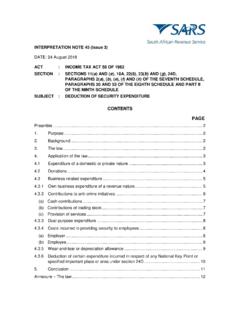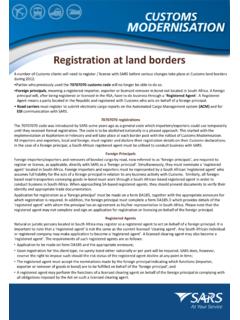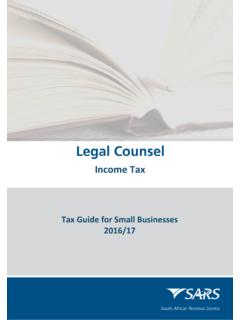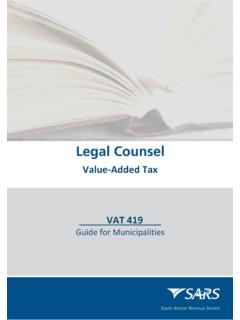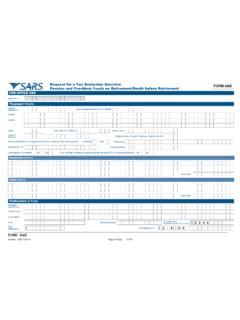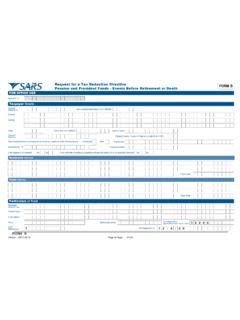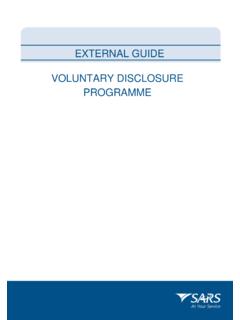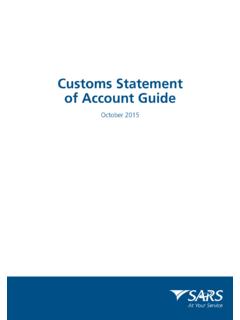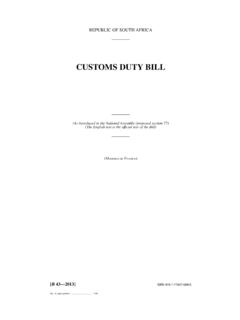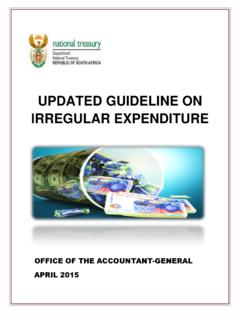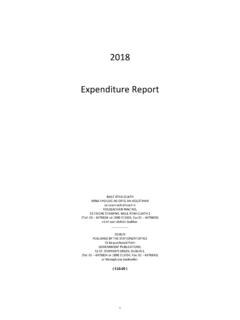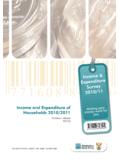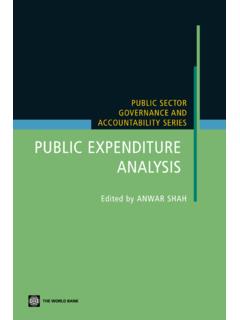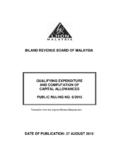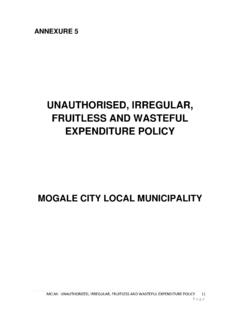Transcription of ACT : INCOME TAX ACT 58 OF 1962 SECTION : SECTIONS 11, …
1 INTERPRETATION NOTE 51 (Issue 5) DATE: 27 June 2018 ACT : INCOME TAX ACT 58 OF 1962 SECTION : SECTIONS 11, 11A AND 23 SUBJECT : PRE-TRADE expenditure AND LOSSES CONTENTS PAGE Preamble .. 2 1. Purpose .. 2 2. Background .. 2 3. The law .. 5 4. Application of the law .. 6 Overview of SECTION 11A(1) .. 6 Deduction of pre-trade expenses after trade has commenced [ SECTION 11A(1)] .. 6 Commencement of trade .. 6 Abandonment of a project before the commencement of trade .. 10 Change in intention or in the nature of the trade .. 10 Meaning of that trade .. 11 Pre-trade expenses actually incurred before the commencement of and in preparation for carrying on a trade [ SECTION 11A(1)(a)] .. 11 Pre-trade expenses which would have qualified under SECTION 11, 11D or 24J had they been incurred after the trade had commenced [ SECTION 11A(1)(b)].
2 12 Pre-trade expenses not allowed as a deduction in the current or any previous year of assessment [ SECTION 11A(1)(c)] .. 15 Ring-fencing of the deduction for pre-trade expenses [ SECTION 11A(2)] .. 15 Limitation of pre-trade expenses to taxable INCOME from the relevant trade .. 15 Impact of assessed loss brought forward on ring-fencing .. 16 Claiming of pre-trade expenses limited by SECTION 11A(2) .. 17 5. Conclusion .. 17 2 Preamble In this Note unless the context indicates otherwise pre-trade expenses mean expenditure and losses actually incurred by a person before the commencement of and in preparation for carrying on a trade; post-trade expenses mean expenditure and losses actually incurred after the commencement of the trade; SECTION means a SECTION of the Act; the Act means the INCOME Tax Act 58 of 1962; and any other word or expression bears the meaning ascribed to it in the Act.
3 All interpretation notes referred to in this Note are available on the SARS website at Unless indicated otherwise, the latest issue of these documents should be consulted. 1. Purpose This Note provides guidance on the deduction of pre-trade expenses (sometimes also called start-up costs) under SECTION 11A. 2. Background New business formation is vital to the economy. Before the introduction of SECTION 11A only certain pre-production interest [ SECTION 11(bA)] and certain finance charges [ SECTION 11(bB)] were permitted as a deduction for start-up costs incurred before the commencement of trade. SECTIONS 11(bA)1 and 11(bB)2 were deleted and now all pre-trade expenses are dealt with under SECTION The trade requirement in SECTION 11(a) read with SECTION 23(g) The general deduction formula in SECTIONS 11(a) and 23(g) reads as follows: 11.
4 General deductions allowed in determination of taxable INCOME . For the purpose of determining the taxable INCOME derived by any person from carrying on any trade, there shall be allowed as deductions from the INCOME of such person so derived (a) expenditure and losses actually incurred in the production of the INCOME , provided such expenditure and losses are not of a capital nature; 1 The deletion of SECTION 11(bA) by SECTION 30(1)(a) of the Taxation Laws Amendment Act 24 of 2011 applies to years of assessment commencing on or after 1 January 2012. 2 The deletion of SECTION 11(bB) by SECTION 14(1)(a) of the Taxation Laws Amendment Act 17 of 2009 came into operation as from the commencement of years of assessment ending on or after 1 January 2010.
5 3 For commentary on the interaction between the now repealed SECTION 11(bA) and SECTION 11A, see the first issue of this Note dated 4 November 2009. 3 23. Deductions not allowed in determination of taxable INCOME . No deductions shall in any case be made in respect of the following matters, namely (a) to (f) .. (g) any moneys, claimed as a deduction from INCOME derived from trade, to the extent to which such moneys were not laid out or expended for the purposes of trade; The opening words of SECTION 11 contain a trade requirement while SECTION 23(g) prohibits a deduction for monies not laid out or expended for the purposes of trade. SECTION 11(a) additionally requires that expenditure and losses be actually incurred in the production of INCOME and not be of a capital nature in order to qualify as a deduction.
6 The trade requirement of SECTION 24J(2) SECTION 24J(2) does not draw a distinction between interest of a capital or revenue nature. It permits a deduction of the amount of interest which is deemed to have been incurred during a year of assessment, from the INCOME derived from carrying on any trade of the issuer in relation to an instrument ,4 if that amount was incurred in the production of the INCOME . The trade requirement of SECTION 11D(2) SECTION 11D(2) provides for a deduction of research and development expenditure actually incurred by a taxpayer, in the production of INCOME and in the carrying on of any trade. Such expenditure must be directly and solely for research and development undertaken in the Pre-trade expenses of a capital nature Pre-trade expenses often form part of the cost of creating a source of INCOME .
7 These expenses are therefore mostly of a capital nature. In ITC 6976 the appellant company commenced to demolish its old building on 1 December 1947 after which it immediately began the erection of a new building. The new building was completed in October 1948, after which it was let to tenants. For the year of assessment ended 30 June 1948, the appellant claimed deductions for rates, sanitary fees and interest totalling 1 110. The Commissioner disallowed the portion of the expenditure for the period 1 December 1947 (when demolition began) to 30 June 1948 (the end of the 1948 year of assessment by which date the erection of the new building had not been completed).
8 Price J stated the following:7 The items disallowed by the Commissioner were disallowed because for a proportionate period in respect of which the expenditure was incurred the building was in the course of erection and was not an asset which could be used to let and to produce INCOME , and that the expenditure , therefore, was of a preliminary or capital nature. It seems to me clear that until the asset becomes an asset capable of producing INCOME any expenditure upon it is of a preliminary nature and is not If a taxpayer has no asset with which he can trade then he cannot be trading. The expenditure was incurred in the creation or equipment of an asset which 4 As defined in SECTION 24J(1).
9 5 The term research and development is defined in SECTION 11D(1). 6 (1950) 17 SATC 93 (T). 7 At 96. 4 was intended to be used at a later stage for the purpose of earning INCOME . It was initial or preliminary expenditure designed to extend the scope of the business or to improve its earning capacity. It was money spent in an attempt to create a source of INCOME or to acquire an advantage for the benefit of the business which was later to be undertaken. A similar outcome prevailed in Borstlap v In August 1974 the appellant in that case, a dentist, purchased erf 1456 with the intention of erecting flats on it for rental purposes. The plot contained an old dwelling and some outbuildings which were let for the first five months of the 1976 year of assessment at R250 a month after which the dwelling was occupied by a family of vagrants who managed to make use of the water and electricity.
10 Demolition of these structures commenced in December 1975 and erection of the flats began during the first quarter of 1976 with the first flats being let during the 1978 year of assessment. During the 1976 year of assessment the appellant claimed a rental loss made up as follows: R R Rental INCOME (5 R250) 1 250 Less: Interest on bonds used to purchase erf 1456 3 435 Insurance 161 Rates 796 Water and electricity (while dwelling occupied by vagrants) 53 Approval of building plans 108 (4 553) Rental loss (3 303) The Commissioner disallowed the rental loss, in so doing allowing only R1 250 of the expenditure as a deduction under SECTION 11(a). Having lost his appeal in the INCOME Tax Special Court the appellant appealed directly to the Appellate Division.
